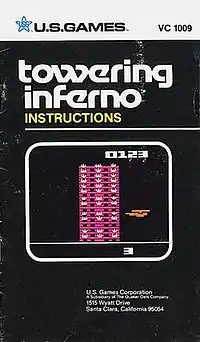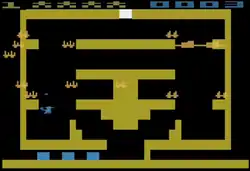| Towering Inferno | |
|---|---|
 | |
| Developer(s) | US Games |
| Publisher(s) | US Games |
| Designer(s) | Jeff Corsiglia[1] |
| Programmer(s) | Paul Allen Newell[2] |
| Platform(s) | Atari 2600 |
| Release |
|
| Genre(s) | Action |
Towering Inferno is an Atari 2600 game designed by Jeff Corsiglia and programmed by Paul Allen Newell and released by US Games in 1982.[2] The player controls a fireman going through a burning skyscraper to save victims and put out the fires. The game was produced under a licence obtained from 20th Century Fox by Quaker Oats, the parent company of US Games, for the video game rights to the movie of the same name.[3]
Newell also programmed the Vectrex port of Scramble,[1] and he co-designed (with Duncan Muirhead) and programmed the original maze algorithm that is the basis for the game Entombed for the 2600, programmed by Steve Sidley and designed by Tom Sloper.[4]
Gameplay

On each floor of the building, the player must put out the flames and reach the panel that opens the doors to get back out. While doing so, there is a meter at the top showing how many people are on that floor. The longer it takes a player to open the doors and get out, the more the meter decreases. The object is to work as fast as you can while avoiding and putting out flames to open the doors and escape with the most people remaining on the meter. The game can be played by one or two players.[5]
Reception
Towering Inferno was reviewed in Video magazine in its "Arcade Alley" column where it was described as "an above-average, enjoyable cartridge [that] is a refreshing change from shoot-shoot-shoot". Reviewers emphasized the non-violent nature of the game, noting that it "achieves a respectable level of excitement without having a shot fired in anger", however they also cautioned readers that the game "may be a little too patterned and repetitive for some".[6]: 40 Videogaming Illustrated described the game as "fast-paced entertainment" and listed it as "highly recommended".[7]
Later reviewers were less forgiving of the graphics but praised the gameplay. In Classic Home Video Games, 1972-1984: A Complete Reference Guide, Brett Weiss describes the graphics as "cheap looking" but describes the gameplay as "original and even compelling".[5]
Paul Allen Newell, when asked in the 21st century what he would change if he could "redo" any of his games, said he could not think of anything he would want to change in Towering Inferno, though he would want to rework other games.[lower-alpha 1][1]
Reviews
See also
- Fire Fighter, another Atari 2600 fire fighting game from 1982
References
- 1 2 3 Stilphen, Scott. "DP Interviews Paul Allen Newell". Digital Press.
- 1 2 Hague, James. "The Giant List of Classic Game Programmers".
- ↑ Herman, Leonard; Feinstein, Keith (1997). Phoenix: The Fall & Rise of Videogames. Rolenta Press. pp. 76, 93. ISBN 0964384825. Retrieved 30 August 2019.
- ↑ Stilphen, Scott. "DP Interviews Paul Allen Newell". Digital Press. "When I left [Western Technologies], there was no "game" [Entombed], just the [maze] algorithm. Steve Sidley was hired when I left and inherited what became Entombed, with Tom Sloper as game designer. I have documentation of that in the form of framed games with plaques that WT had in the halls that were rescued when lots of stuff got thrown out (nobody could find the Scramble one). I quickly versed Steve in 6502 and the nature of the maze algorithm and took my leave." --Paul Allen Newell
- 1 2 Weiss, Brett (2011). Classic Home Video Games, 1972-1984: A Complete Reference Guide. McFarland. p. 125. ISBN 978-0786487554. Retrieved 30 August 2019.
- ↑ Kunkel, Bill; Katz, Arnie (November 1982). "Arcade Alley: Beyond Science Fiction–A New Breed of Games". Video. Reese Communications. 6 (8): 40, 110. ISSN 0147-8907.
- ↑ "Towering Inferno". Videogaming Illustrated: 62. February 1983. Retrieved 2 September 2019.
- ↑ "GAMES Magazine #34". December 1982.
Notes
- ↑ such as to "do [Scramble] right" by making an 8 KB version instead of the 4 KB released version, and to completely rewrite Cube Quest, which was released in an unfinished and underdeveloped form
External links
- Towering Inferno at Atari Mania
- Towering Inferno at AtariAge
- Documented source code and original instructions for Towering Inferno for the Atari VCS, made available by Paul Allen Newell. (Scroll to the bottom of the webpage to find two hyperlinks to text files, below a statement of limited terms of free use.)